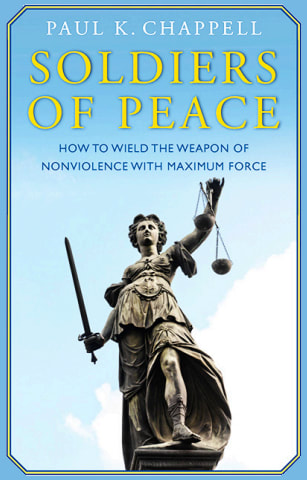
Excerpted from an interview with Paul Chappell, hosted by Zoe Weil for the Institute for Humane Education, April 2022
Peace Literacy offers a deep and accurate understanding of the many subjects relevant to the creation of a more peaceful and just world. Peace Literacy consists of the idea that peace is not merely a goal, but a competency — a literacy — similar to reading and writing, which we can learn to use with greater and greater effectiveness. In the Twenty-First Century, we can no longer settle for peace as an abstract concept or sentimental wish. Peace Literacy is a rigorous and strategic approach to peacemaking that is based on the recognition that we must take waging peace at least as seriously as the military takes waging war.
Peace Literacy consists of three basic elements:
The first is the development of human capacities, which we call the muscles of our humanity. One of these capacities is hope, which is like a muscle, because it requires strengthening and development, and can become more powerful in degrees. Peace Literacy cultivates realistic hope based on evidence, experience, and ideals. Realistic hope is proactive and connected to action.
The muscles of empathy and conscience drastically affect how we think and reason. In Peace Literacy, we say that stewardship is the highest expression of the muscle of appreciation, because appreciation allows us to not take the gifts of life for granted. Gifts such as health, friendship, and democracy are fragile, and can be damaged and destroyed when we are not behaving as responsible stewards and protectors. Appreciation encourages us to never take these gifts for granted, to savor and make the most of them, and to do our best to protect them.
The second element of Peace Literacy is the building of skills to flex the muscles of our humanity. To offer just one example, listening is a skill that requires me to flex my muscle of discipline, to focus my mind and concentrate. In order to truly listen, I must also flex my muscle of empathy. When I flex my muscle of empathy, I am capable of hearing not only your words, but also your humanity.
The third element of Peace Literacy involves increasing the accuracy of our understanding of how the world works. When people with empathy and conscience don’t have an accurate understanding of the root causes of problems, they can cause harm. As the old saying goes, “The road to hell is paved with good intentions.”
Soldiers of peace must understand the tangles of trauma; the root causes of aggression; the
critical importance of our non-physical needs such as purpose, meaning, belonging, and self-worth; the relationship between our human vulnerability and our technology; the behaviors that can reliably build shared trust between individuals, communities, and nations; the limitations and risks of waging war, and the power and potential of waging peace.
The elements of Peace Literacy can be taught in three ways. They can be taught through curriculum, scaffolded in age-appropriate ways for pre-K through adult education. They can be taught through example, when adults lead by example by practicing Peace Literacy. The third way that Peace Literacy elements can be taught is through culture. We can create a culture in a school, workplace, family, community, and society that strengthens Peace Literacy and nurtures the full development of our humanity.
Paul K. Chappell is an American activist. He is the Director of the Peace Literacy Institute. A graduate of West Point and a veteran of the war in Iraq, he created the idea of Peace Literacy after his time in the military.

 RSS Feed
RSS Feed
